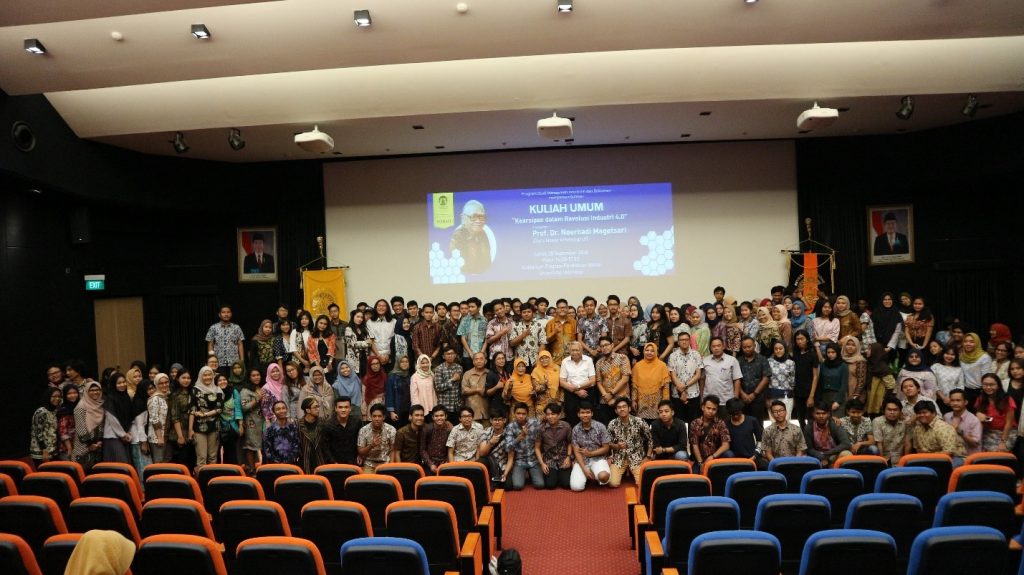DEPOK – The current development of information and communication technology (ICT) has brought the world into industry 4.0. This era is marked by the abundance of data and information, cyber physical systems, to the management of big data. For information workers – including archivists – this is what must be anticipated from the start because the landscape can be completely different from what is currently available.
“Archives of the 4.0 era will be marked with archives processed by computers and accessed via a computer,” said Noerhadi Magetsari, Emeritus Archeology Professor at the UI Faculty of Cultural Sciences and former Head of the National Archives of the Republic of Indonesia in a public lecture on the theme “Archives in the 4.0 Industrial Revolution”. The lecture was attended by students, professionals from various ministries and institutions, as well as Universitas Indonesia lecturers at the Vocational Education Program Auditorium (28/9/2018). In his remarks, Dyah Safitri as Chair of the UI Vocational Education Information and Document Management Study Program, this public lecture is expected to provide new insights to the world’s archival stakeholders that the challenges faced in the future, especially when the industry 4.0 era begins.
 The industrial 4.0 era is characterized by various phenomena such as IoT (interner of things) that enable all machines to communicate and connect, artificial intelligence, big data, to the emergence of smart labels for various sectors such as smart offices, smart cities, and smart transportation. “The key word is being able to collaborate between institutions so that they become more efficient,” added Noerhadi. Integrated and knowledge-based collaboration will be able to produce innovation, especially in managing up to analyzing big data. For the world of archives, added Noerhadi, that the industrial era 4.0 makes archive life another but archives management principles can still be used. “About selection and archive access, because later all are machine-based, so the protocol in the computer program is set. Selection in the form of a program in the form of sensors. The principles of the world of archives can still be used even though they will all be engine-based, “Noerhadi added. In this way archivists remain the necessary profession in the industrial era 4.0. “Ideally, all archives are electronic and submitted to the machine, but in fact there is still text as an archive. “Is it then digitized or there are other steps, archivists who can later give meaning,” said Noerhadi.
The industrial 4.0 era is characterized by various phenomena such as IoT (interner of things) that enable all machines to communicate and connect, artificial intelligence, big data, to the emergence of smart labels for various sectors such as smart offices, smart cities, and smart transportation. “The key word is being able to collaborate between institutions so that they become more efficient,” added Noerhadi. Integrated and knowledge-based collaboration will be able to produce innovation, especially in managing up to analyzing big data. For the world of archives, added Noerhadi, that the industrial era 4.0 makes archive life another but archives management principles can still be used. “About selection and archive access, because later all are machine-based, so the protocol in the computer program is set. Selection in the form of a program in the form of sensors. The principles of the world of archives can still be used even though they will all be engine-based, “Noerhadi added. In this way archivists remain the necessary profession in the industrial era 4.0. “Ideally, all archives are electronic and submitted to the machine, but in fact there is still text as an archive. “Is it then digitized or there are other steps, archivists who can later give meaning,” said Noerhadi.
 In the question and answer session, Noerhadi Magetsari also emphasized that the important aspect that is often overlooked from archive management is the information aspect. “The important question is how not only to save the archive but how to manage the information,” said Noerhadi. One of the functions of the archive is managing information by helping our memory not to forget. “In that context, archivists can save state assets,” he added. Meanwhile, from the data side, big data should collaborate with the aim of reducing costs and making quick decisions. The question of whether it is concentrated or does not stay depends on the needs. “Like the e-KTP recording data, it should be used for other purposes so that population data access will be faster,” he said.
In the question and answer session, Noerhadi Magetsari also emphasized that the important aspect that is often overlooked from archive management is the information aspect. “The important question is how not only to save the archive but how to manage the information,” said Noerhadi. One of the functions of the archive is managing information by helping our memory not to forget. “In that context, archivists can save state assets,” he added. Meanwhile, from the data side, big data should collaborate with the aim of reducing costs and making quick decisions. The question of whether it is concentrated or does not stay depends on the needs. “Like the e-KTP recording data, it should be used for other purposes so that population data access will be faster,” he said.
What is clear, the industrial era 4.0 is a necessity that must be accompanied by the ability to adapt. Including for archivists and prospective archivists. They must understand very well how the 4.0 era will change many things including in the archives world. Therefore, early readiness by providing information and communication technology, management and processing of big data to realize collaboration with others becomes very necessary.




